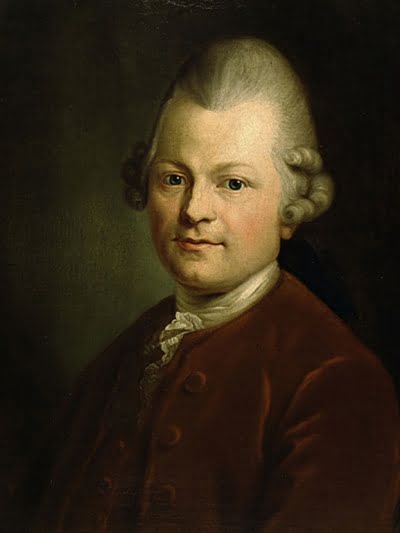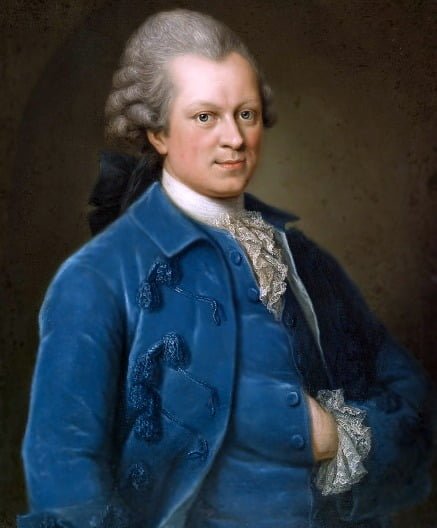
Gotthold Ephraim Lessing was born at Kaumitz, in the Neiderlausetz, January 22, 1729. In 1746 Lessing moved to Leipzig to attend University. Lessing was the son of a theologian and was expected to follow in his father’s footsteps. “In 1746 Lessing moved to Leipzig to attend University there. It was here that he began to expand his intellectual horizons and to explore areas outside theology.
His mind soon became free from the restraints of home and he began to dabble in theatre-acting and writing. It was here that he began to see the truth in popular literature, in art, in philosophy, in the history of Europe and the Middle East, and, even in mathematics. His interest in these subjects drew him into the company of a wider social world and the people of those disciplines soon became his compatriots and friends. Among them, he received encouragement to write for the theatre and to abandon theology. He seems to have learned that truth was to be found in many places and that God would use the full talents of those he created to reveal and manifest truth.
Lessing was initiated in a Lodge at Hamburg and was made a Master Mason on October 14, 1770. Freemasonry does not require adherence to any particular religion, only a belief in God. This was not the case for Lessing in Germany (and France) where Jews were denied admission because of their religion. In England “in 1723 the Reverend James Anderson, acting on instructions of the Grand Master of England drew up his now famous The Constitutions of the Freemason, to guide the revival of the order in that country. Anderson was well aware that religious differences had convulsed England a few decades ago, and so he wanted to create a plateau of peace where all men might unite as brothers before the sacred altar of the Fraternity.”
Frederick the Great was the Grand Master in Prussia, and many German men became Freemasons because of this monarch. Lessing had a very important job as librarian of the Duke of Braunschweig which he could not afford to lose. He had suffered many months of financial hardship before this job. Lessing had a very dear Jewish friend named Moses Mendelssohn who was very hurt by Lessing’s membership in Freemasonry. Mendelssohn stated that Lessing had “new truths that he could not share with an old friend. Less- ing knew that Mendelssohn had a right to an answer, but the question was how?” – Lessing wrote some harsh criticisms of what he saw as hypocritical in an order that proclaimed brotherly love. Lessing did not lose his job but was ordered by the Duke of Braunschweig not to publish anything more than was controversial in nature. “As a dramatist, Lessing hit on the idea of using the stage to correct the raw injustice in German lodges and to teach German brothers something that they should have already learned. The result was two works: Ernst and Falk, his famous essay about Freemasonry, and Nathan the Wise, a drama that is now known worldwide as his great plea for religious tolerance.” -7-
Lessing’s first work deals with the reasons why one man becomes a Mason. “The two characters are Falk (Lessing), a sharp and skeptical Mason, and Ernst, an inquiring young friend. Ernst is eager to learn as much as possible about the order, but Falk repeatedly responds to his friend’s queries in an elliptical manner, which leaves him more confused than ever. Thus, to Ernst’s straightforward question whether he is a member, Falk replies: “I believe that I am.” This evasive answer is incomprehensible to Ernst, for whom membership in the order is simply a question of fact, and Falk is forced to clarify his meaning. “I believe that I am a Freemason, not so much because I comprehend and know, what and why Freemasonry is, when and where it has been, how and by what means it is advanced or hindered.” -8- Here Lessing speaks to the Mason who simply joins the order but never searches for more enlightenment through Masonic history and it’s great thinkers. Lessings theory that Freemasonry evolved from the Knights Templar in the fourteenth century was rejected many years ago. Today Baigent and Leigh’s work are evidence that Lessing’s theory is very much alive in many historical and Freemasonic circles.
Nathan the Wise is more about the meaning of a Mason’s obligation. In this play Nathan is a Jew-ish merchant who is summoned by the Sultan Saladin who wants him to make a choice between Christianity, Mohamadism, and Judaism. Nathan is really Lessing’s beloved friend Mendelssohn. Nathan realizes that the Sultan wants him to choose one religion as the greatest religion and instead tells the “Parable of the Three Rings.” The father in this parable has a beautiful gold ring that he wants to pass on. The problem is that he has three sons. A goldsmith is able to duplicate two other rings so that even the father cannot tell which is the original ring. The sons fight over who has the “true ring” and bring their problem to a famous judge for his decision. The judge in this parable is the Master Mason and he is unable to choose. “I understand that the owner of the true ring is loved by his fellow men. Which one of you three do the others love best?” The sons realize that they all must have the false ring because all of them loved themselves more than their brother. The judge instructs them “to go out and show through their noble acts devoted to helping mankind that they wore the original ring. In time they might return before a wiser judge who would decide the question. Lessing meant his Nathan the Wise to be a sharp reminder to all Masons that they have taken upon themselves a solemn and binding obligation to their order.” – Nathan does not believe that any man should view their religion as the only road to salvation. It is interesting to note than even today Freemasonry receives the sharpest criticism from those who believe their religion/church is the only road to salvation. Although some men prefer the Lodge to organized religion, Freemasonry does not replace religion. “Nathan and Saladin may be said to be above the prejudices of their religion in the sense of the Freemason, and thus able to love men as men, they have not totally rejected their traditional faith.” – 10- Lessing believes that the one true “religion” that all people should agree with is “the Masonic principle of unbiased love, prompting service for others.”
Therefore, let each one imitate this love; So, free from prejudice, let each one aim To emulate his Brethren in the strife To prove the virtues of his several ring, By offices of kindness and of love, And trust in God. And if, in years to come, The virtues of the ring shall reappear Amongst your children’s children, then, once more Come to this judgment-seat. A greater far Than I shall sit upon it, and decide. So spake the modest judge.
Lessing died on February 15, 1781. He died before German lodges dropped the ban against Jews. German Masonry does have Lessing to thank for eventually allowing men of all religions into the fraternity. In 1920 a Grand Lodge in Czechoslovakia was named The Grand Lodge Lessing of the Three Rings. The Nazis destroyed this Grand Lodge. Lessing wrote in one of the dialogues of Ernst and Falk:
That it was always the surest indication of a healthy vigorous political constitution if it allowed Freemasonry to flourish by its side, just as it is still the infallible characteristic of a week, timorous state if it will not openly tolerate what it must tolerate in secret.”
Hitler did not tolerate Freemasonry. There was only one other group that Nazis and Fascists hated more than the Jews, and that was the Freemasons.
